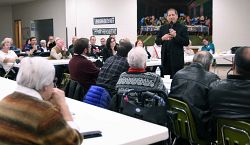Pastoral Plan implementation under way

LAYTON — Pastors and parish leaders in the northern part of the Diocese of Salt Lake City gathered Dec. 4 with Bishop Oscar A. Solis to discuss implementation of the Pastoral Plan in their specific parishes.
Accompanying Bishop Solis to the meeting at St. Rose of Lima Parish were some members of the Diocesan Pastoral Council, who advise the bishop, and directors of some of the diocesan offices.
Bishop Solis began the meeting by reviewing the history of the Pastoral Plan. When he came to the diocese in 2017 he wanted to encourage a renewal of the faith life in the diocese and establish vibrant faith communities comprised of “people of God, parishioners, who are filled with joy and enthusiasm in living their faith as followers of Jesus,” he said.
A month after he was installed, in April 2017, Bishop Solis published his first pastoral letter, “A Springtime of the New Evangelization,” in which he discussed how to involve the entire faith community to “bring about that spiritual renewal among our priests, deacons, women and men religious, and the laity; in our parishes and schools, pastoral and social ministries, and other components of Church life.”
As he learned about the needs of the diocese, he discovered that his predecessor, the Most Rev. John C. Wester, now Archbishop of Santa Fe, had begun the Pastoral Plan process four years before. After reviewing the data that had been gathered through that process, and taking further steps to consult with clergy and laity throughout the diocese about their wants and needs, Bishop Solis released the diocese’s Pastoral Plan in September 2018.
The plan has five priorities: faith formation, vocations, stewardship, Eucharist and Catholic identity, and dignity of the human person. Each of the priorities has its own goals, objectives and strategies. The plan also set the course for the diocese for the next five years.
In the year since the plan was published, parishes throughout the diocese have begun implementing aspects of it that best address their needs. A recent survey from the bishop’s office asked for an update on how the process is going at the parishes. The Dec. 4 meeting was intended to help parishes continue their implementation of the plan.
A similar meeting was held Dec. 10 in Notre Dame Parish, for pastors and parish leaders in the southern part of the state.
At the Dec. 4 meeting, Bishop Solis emphasized the diocesan-wide collaboration that went into creating the Pastoral Plan. “It is not my plan, it is our plan,” he said.
From the recent parish survey, faith formation emerged as the overarching priority, he said, and the goal is to develop Catholics of all ages who know the faith, have had an encounter with the living God and are missionary disciples who are “able to share our faith, our understanding, our belief about Jesus,” the bishop said.
In addition to faith formation, each parish will have its own priorities within the framework of the Pastoral Plan, depending on its individual needs, said Julie Boerio-Goates, a member of the Diocesan Pastoral Council who has been involved with the Pastoral Plan since the process began in 2013.
Bishop Solis has asked the members of the Diocesan Pastoral Council to help parishes implement the Pastoral Plan.
To put the plan into action, parish leaders and representatives of the diverse groups within the parish should meet to review the five priorities and decide which are most important for them, Boerio-Goates said. Then the goals and objectives to achieve the priorities should be discussed, and a plan undertaken to meet them. As the plan gets under way, its implementation should be evaluated and future goals set, she said.
Diocesan Pastoral Council members can help parishes with the implementation, and also relay what has worked at other parishes, said Deacon Michael Bulson, another DPC member.
The Pastoral Plan must be collaborative to create a more vibrant faith community in the diocese, Bishop Solis said.
“This is the mission of God entrusted to us to see to it that the Gospel is proclaimed to all people, especially our children,” he said.
© Copyright 2024 The Diocese of Salt Lake City. All rights reserved.

Stay Connected With Us